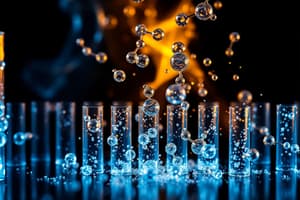Podcast
Questions and Answers
Group I-A: __________
Group I-A: __________
Alkali Metals
Which of these options describes alkali metals?
Which of these options describes alkali metals?
- Most reactive (correct)
- Inert
- Form acidic oxides
- Do not react with oxygen
They are very reactive that they do not occur freely in nature. __________
They are very reactive that they do not occur freely in nature. __________
True
What is the valence of alkali metals?
What is the valence of alkali metals?
Which element is the lightest alkali metal?
Which element is the lightest alkali metal?
Alkali metals react with halogens to form salts.
Alkali metals react with halogens to form salts.
Which alkali metal has the highest melting point?
Which alkali metal has the highest melting point?
Which alkali metal's atomic number is 19?
Which alkali metal's atomic number is 19?
Match the following alkali metals with their atomic numbers:
Match the following alkali metals with their atomic numbers:
What is the principal use of lithium in medicine?
What is the principal use of lithium in medicine?
Which drug is the drug of choice for treating mania?
Which drug is the drug of choice for treating mania?
Which alkali metal has a melting point above 100°C?
Which alkali metal has a melting point above 100°C?
Which of the following is the lightest metal?
Which of the following is the lightest metal?
Who discovered hydrogen?
Who discovered hydrogen?
Flashcards are hidden until you start studying
Study Notes
Alkali Metals Overview
- Group I-A elements, known for their high reactivity and distinct properties.
- Alkali metals include Lithium, Sodium, Potassium, Rubidium, Cesium, and Francium.
- They are active elements that commonly do not occur freely in nature due to their reactivity.
Properties of Alkali Metals
- Highly reactive with Oxygen, forming basic oxides.
- Valence electron count is one, indicating a strong tendency to lose this electron.
- Softness makes them unique; softer than most metals.
- React with halogens to form salts.
Reactivity and Alkalinity
- Reactivity and alkalinity increase with atomic number as you move down the group.
- Sodium, for example, attracts the oxygen in water due to its positive ion charge.
- Degree of solvation decreases with increasing atomic number.
Physical Properties and Trends
- Atomic size increases, while melting points decrease as you descend the group.
- Specific melting points:
- Lithium: 186 °C
- Sodium: 97.8 °C
- Potassium: 62.3 °C
- Rubidium: 38.4 °C
- Cesium: 28.5 °C
- Francium: 27 °C
Hydrogen
- Shares similarities with alkali metals but is not an alkali metal itself.
- Discovered by Henry Cavendish; named by Antoine Lavoisier.
- Isotopes: Protium (most abundant), Deuterium (heavy water), Tritium (radioactive).
- Abundant in the universe and used in applications like air balloons.
Lithium
- Derived from the Greek word “lithos” meaning stone; lightest metal.
- Density of Lithium is 0.534 g/ml; discovered by J.A. Arfwedsen.
- Has a therapeutic use for treating mania, but with a narrow therapeutic index.
Pharmacologic Actions of Lithium
- Acts as a CNS depressant.
- Serves as a diuretic and is used to treat mania and various disorders.
- Can cause side effects like movement tremors and nephrogenic diabetes insipidus, and potential pregnancy issues like Ebstein’s anomaly.
Lithium Compounds
- Lithium Bromide (LiBr): Used as a CNS depressant; sedative/hypnotic.
- Lithium Carbonate (Li2CO3): Anti-rheumatic agent, used in lithia water manufacturing.
- Other Compounds:
- Lithase (mania treatment)
- Quilonium (antacid)
- Eskalith
Bromide Elixirs
- Common bromide elixirs include:
- Ammonium Bromide
- Sodium Bromide
- Potassium Bromide
- Lithium Bromide
- Calcium Bromide
Quick Quiz Insights
- Alkali metals are considered the "soluble group" and recognized as the most reactive metallic elements.
- Lithium is the lightest metal among the options provided.
- Lithium carbonate is the drug of choice for treating mania.
Studying That Suits You
Use AI to generate personalized quizzes and flashcards to suit your learning preferences.





